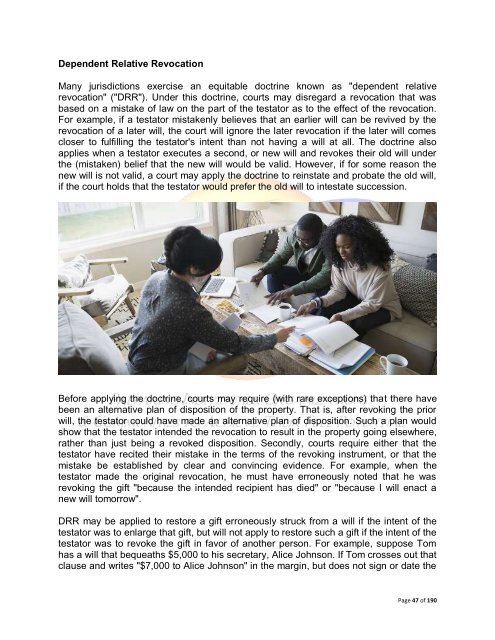Wills, Trusts & Estates
Wills, Trusts & Estates
Wills, Trusts & Estates
Create successful ePaper yourself
Turn your PDF publications into a flip-book with our unique Google optimized e-Paper software.
Dependent Relative Revocation<br />
Many jurisdictions exercise an equitable doctrine known as "dependent relative<br />
revocation" ("DRR"). Under this doctrine, courts may disregard a revocation that was<br />
based on a mistake of law on the part of the testator as to the effect of the revocation.<br />
For ex<strong>amp</strong>le, if a testator mistakenly believes that an earlier will can be revived by the<br />
revocation of a later will, the court will ignore the later revocation if the later will comes<br />
closer to fulfilling the testator's intent than not having a will at all. The doctrine also<br />
applies when a testator executes a second, or new will and revokes their old will under<br />
the (mistaken) belief that the new will would be valid. However, if for some reason the<br />
new will is not valid, a court may apply the doctrine to reinstate and probate the old will,<br />
if the court holds that the testator would prefer the old will to intestate succession.<br />
Before applying the doctrine, courts may require (with rare exceptions) that there have<br />
been an alternative plan of disposition of the property. That is, after revoking the prior<br />
will, the testator could have made an alternative plan of disposition. Such a plan would<br />
show that the testator intended the revocation to result in the property going elsewhere,<br />
rather than just being a revoked disposition. Secondly, courts require either that the<br />
testator have recited their mistake in the terms of the revoking instrument, or that the<br />
mistake be established by clear and convincing evidence. For ex<strong>amp</strong>le, when the<br />
testator made the original revocation, he must have erroneously noted that he was<br />
revoking the gift "because the intended recipient has died" or "because I will enact a<br />
new will tomorrow".<br />
DRR may be applied to restore a gift erroneously struck from a will if the intent of the<br />
testator was to enlarge that gift, but will not apply to restore such a gift if the intent of the<br />
testator was to revoke the gift in favor of another person. For ex<strong>amp</strong>le, suppose Tom<br />
has a will that bequeaths $5,000 to his secretary, Alice Johnson. If Tom crosses out that<br />
clause and writes "$7,000 to Alice Johnson" in the margin, but does not sign or date the<br />
Page 47 of 190

















